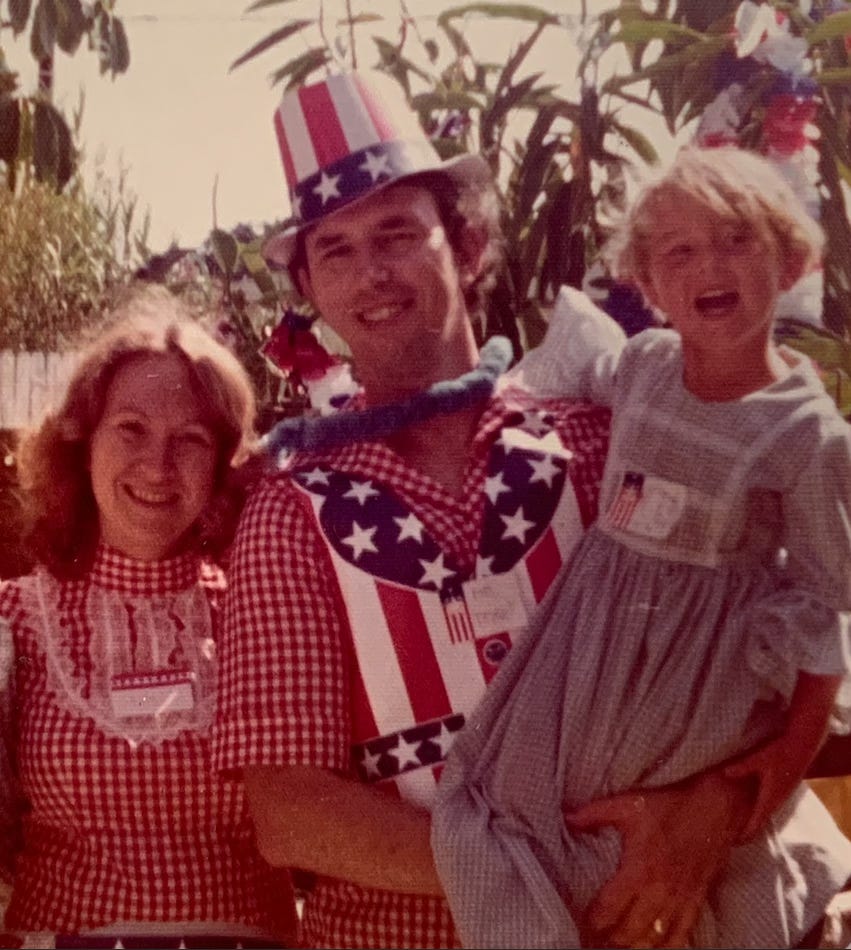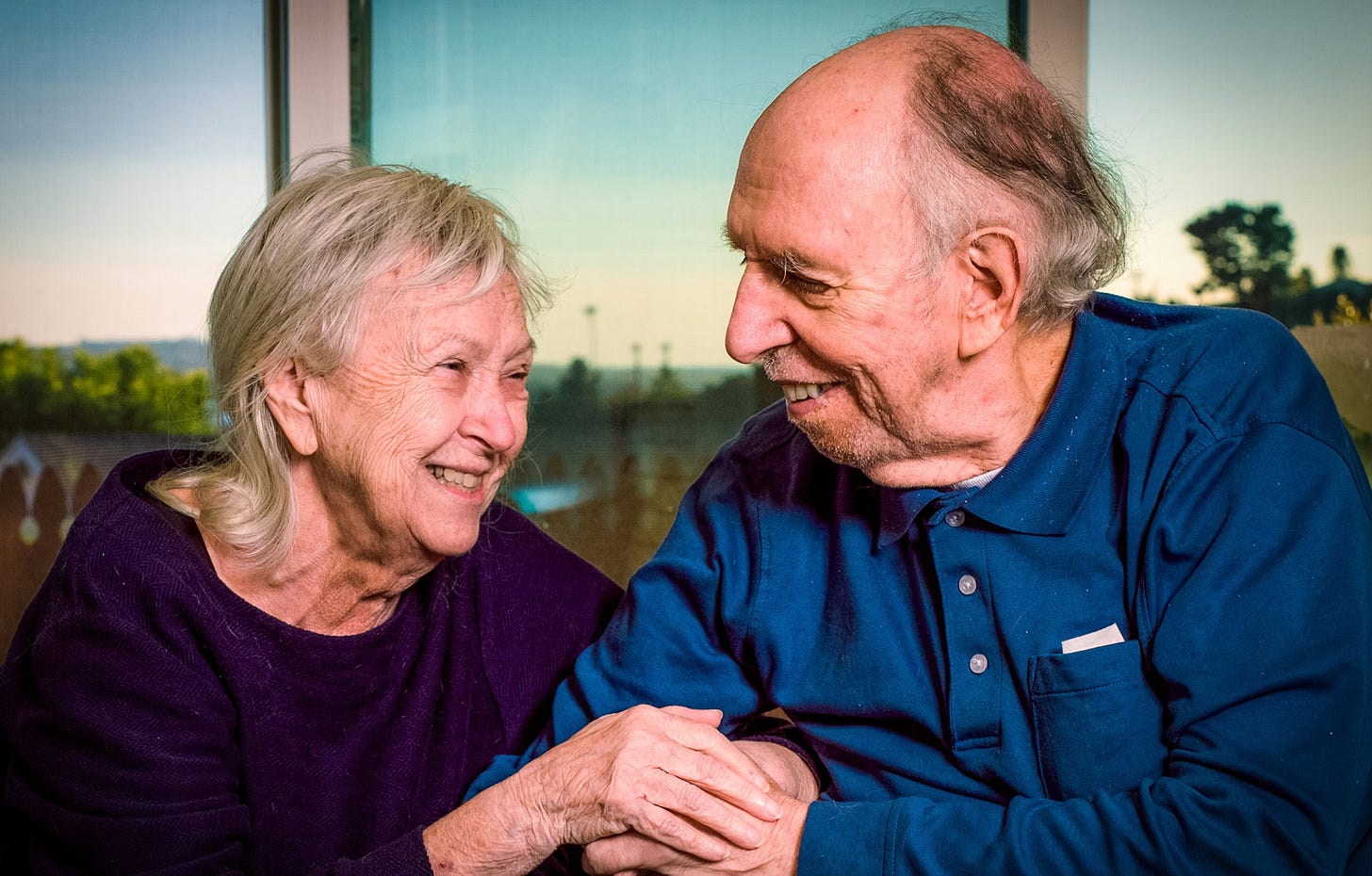I was raised to be an American
This country is something to be treasured, defended, and preserved.
I was raised to be an American. Maybe this seems like something you’d write too, but to really understand me you have to understand—I was raised to be an American.
One of my beloved memories from childhood was Fourth of July, 1976. I was four and a half years old. It was the bicentennial. My grandmother had made gingham dresses for the women and girls in my family and shirts for the men. We had a big barbecue in my aunt JoAnn's and uncle Dan’s back yard where the entire block came together to eat. My grandfather manned the grill and made a Hungarian delight called Szalonna. He’d turn the meat slowly, pulling the pork off the fire to catch the drippings of fat onto a piece of rye bread. When parts of the meat were cooked, he’d shave off bits onto the bread and add peppers and onions. Of course there were hot dogs and hamburgers too, but that dirty bread, as we called it, was a staple of our Fourth of July cook out every year. My grandfather would tell the story of his parents journey to the United States to become Americans. We’d pay tribute to those who wore the uniform. My uncle would read the Declaration of Independence. We’d play U.S. Presidential bingo and Constitutional Trivia. The night would be capped off by watching fireworks and singing the national anthem.
Another memory was of working the polls with my aunt. She was a teacher, and her school’s gym was a polling place. Every year my aunt would negotiate with my mom to give me the day off school. Every year her argument was the same, “She’s not missing school, Suzy. She’s just going to a different one.” Thankfully, every year, my mother would give in to my aunt. And every year I’d get to help out in some important way, like making sure we had enough pens or making sure the poll workers had water. As I got older, my responsibilities extended to handing out the coveted I voted stickers. I had to demonstrate some restraint before I was allowed to handle the stickers for official purposes because a year or so earlier I had covered my entire notebook, arms, hands, and forehead with them. Eventually I was old enough to work the polls. I’d ask for the day off, drive to my aunt’s school, and sit next to her. We’d work the polls during the day, my uncle would work the polls in the evening after his workday was over, and when the polls closed we’d have a party. All my aunt's and uncle’s friends were invited to watch the returns. Your admission ticket was your I voted sticker. Some years we’d turn our Election Day parties into costume parties: come as your favorite president or American icon. Dan dressed as an elephant, JoAnn as a donkey. I came as John Adams. Election Day was a family holiday as much as it was a day of duty.
As age and illnesses creeped into the picture for my aunt and uncle, our election day activities changed. We took to gathering at the dining room table in the weeks before election day to fill out our mail-in ballots. We’d go through the ballot, make sense of what each proposition was trying to accomplish, and vote. One year my uncle’s caregiver decided to join us at the table. “Tell me how to vote, Jennifer. I vote the way you tell me to.” “Absolutely not. I’ll help you understand what your yes means and your no means, but it is up to you to decide. No one can do it for you and no one should ever tell you how to vote. It’s your right as an American to decide for yourself.” She was a new citizen. She had immigrated here from Somalia. It was her first time voting. I remember looking over at my aunt, who had tears in her eyes watching me help Fatima with her ballot. It was a joy to help Fatima make the choices she wanted to make for herself and her loved ones. We celebrated our family’s new voter by going out to lunch with our I voted stickers on. I didn’t know it at the time, but I would only have one more election with my aunt and uncle.
I tell you all this so that when I say I was raised to be an American you understand, at least a little, what I mean. This country is in my bones. It was passed down to me the same way a family heirloom gets handed down from generation to generation. This country is something to be treasured, defended, and preserved. When my aunt and uncle passed, I lost the two people who raised me. In the three years since their deaths I have voted, but I have no recollection of either the first election or the second. I was more aware of the grief that accompanied election season with the third, but that didn’t stop me from being caught off guard by it. I was numb, disassociated from my feelings. I recall driving with my husband to drop my ballot off only to burst into tears and be overwhelmed by pain. With each year since their passing, it’s been the same cycle whether it is Fourth of July or Election Day. I do not see it coming even as I know it is. Even as I try to welcome my feelings, I have already buried them. For my entire life I have relied upon a separation between what I feel and what I know. It has been helpful. I was able to survive trauma and neglect inflicted upon me by my mother. I was able to withstand the indifference of familiars and strangers alike as they watched and allowed the child I was to suffer. I was able to do this until grief.
This year, from the time I retrieved my ballot from the mail until I voted, I walked around knowing the grief would come, but I was unable to feel it coming. I started to feel run down, tired even though my sleep was good, ill even though I had no temperature. These are my signs and symptoms of grief ignored. I start looking for causes outside of me — Did I eat something bad? Did I pick up a bug from the grocery store clerk? I replay my activities, thinking there might be a clue somewhere. After I completed my ballot it sat on the kitchen table. A visual reminder of the grief sitting there, in the house, waiting for me to notice. I put off driving myself to drop off my ballot, citing a general lack of motivation. Finally, two weeks out I decided I needed to take it in. I got in the car feeling so tired, like someone had thrown a weighted blanket on me. I arrived at the library, parked the car, got out, and walked up to the door. I chatted inside for a minute with the poll worker and then it started, or rather I started. My voice cracked and I realized I had to get out of there. I hurriedly dropped my ballot into the drop box and made it to the car just in time to start sobbing. Election season is a time of grief for me, and despite my knowing that it will be so until I die, I keep hoping it will get better, easier, less. This is utter stupidity. I know it is utter stupidity. Even now as I understand this, I struggle to stay connected to my grief, to welcome it, to recognize it when it is upon me.
If you’ve ever lost someone you love, you know that if you turn away from the grief, you turn away from nearly everything that was. The love. The memories. The people. The traditions. This poses a difficult conundrum for me, particularly in light of my vision— Fulfill the Promise of the Republic. In order to connect to the fullness, optimism, and depth of my commitment to America I have to wade into the depths of grief. I have to go to where Dan and JoAnn still live in me. I have to allow the grief to be known and felt, to move through me, and to move me so I can fulfill the promise of the Republic. Without fully engaging with the grief I cannot fully encounter my vision, which is inextricably connected to me and to the two people I lost and grieve.







